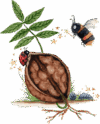Curriculum & Approach
A wide feast of living ideas, served on a foundation of warm connection.
MindGarden Learning brings together Charlotte Mason’s timeless philosophy of short, beautiful lessons with modern attachment and neuroscience research so every child can grow in curiosity, confidence, and calm.
Our Philosophical Roots 🌿
| Pillar | What it looks like at MindGarden |
|---|---|
| Charlotte Mason “Feast” | 15- to 20-minute living lessons, narration, nature notebooks, picture & composer study, and plentiful free play |
| Attachment-based Development | Classroom culture centers on safety, belonging, and secure adult relationships, following the stages mapped by Dr. Gordon Neufeld |
| Polyvagal-informed Practice | Teachers respond with connection first—using warmth, presence, and gentle support to help children feel safe and regulated. |
“Education is an atmosphere, a discipline, a life.”
— Charlotte Mason
This simple yet profound statement captures Mason’s vision of a whole-child education. “Atmosphere” refers to the emotional and relational tone of the learning environment—children absorb far more from how we live and relate than from what we directly teach. When the environment is warm, respectful, and rich with meaningful relationships, learning becomes natural and nourishing.
The Feast of Subjects 🍽️
| Scope | Living Content Examples |
|---|---|
| History & Geography | America First (updated ed.), Living Geography series, map work & dramatic play |
| Natural History & Nature Study | Wildlife in Woods & Field, weekly “Nature Show-and-Tell,” indoor soil & insect trays |
| Poetry & Recitation | A Child’s Garden of Verses, Poems Every Child Should Know |
| Picture / Composer Study | One artist & composer per term with visual narration or active listening |
| Handicrafts | Clay, sewing, weaving, origami—building skill and patience |
| Music & Folk Songs + Foreign Language | Wildwood folksong playlist; introductory Spanish songs |
(Core academics—math, phonics, formal science—remain with families at home.)
How We Teach ✨
- Short, Focused Lessons – keep minds fresh and leave room for wonder.
- Narration over Tests – children retell, sketch, and dramatize to process ideas.
- Emergent Learning – play and imagination arise after connection, not through extrinsic rewards.
- Living Books > Worksheets – rich language sparks vocabulary naturally.
- Reflect & Reset – quiet breathing or movement between blocks supports regulation.
Behaviour & Emotional Support 🫶
We do not use sticker charts, time-outs, or punitive systems. Challenging behaviour is seen as a signal of unmet need or dysregulation. Teachers first connect, co-regulate, then guide—helping children return to a receptive state for learning.
Nature Study…Indoors? 🍃
Though Jungle Fun Center lacks an outdoor classroom, we bring nature to us:
Younger Siblings Policy 👶
Ages 4–5 may attend with an enrolled older sibling if developmentally ready.
Their day emphasises connection and imaginative play rather than narration or table work, aligning with Charlotte Mason’s spirit and modern developmental research.
Sample Weekly Flow ⏰
See exactly how these principles unfold in our Monday & Wednesday timetable on the Program page.
Ready to Grow With Us?
View Tuition & Register ↗ · Questions? Contact us
